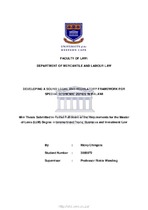| dc.contributor.advisor | Wandrag, Riekie | |
| dc.contributor.author | Chingota, Ricky | |
| dc.date.accessioned | 2020-02-20T10:15:41Z | |
| dc.date.available | 2020-02-20T10:15:41Z | |
| dc.date.issued | 2019 | |
| dc.identifier.uri | http://hdl.handle.net/11394/7137 | |
| dc.description | Magister Legum - LLM | en_US |
| dc.description.abstract | Export Processing Zones (“EPZs”) were introduced in Malawi in 1995. EPZs are one of several types of Special Economic Zones (“SEZs”). The legal and regulatory framework for the Malawi EPZs was established by the Export Processing Zones Act, 1995 (“EPZ Act”). There is also subsidiary legislation made under the EPZ Act, namely, the Export Processing Zones (Fees and Forms) Regulations (“EPZ Regulations”).
EPZs primarily focus on promoting the processing and manufacturing of goods for export. The Malawi EPZs were thus intended to provide a conducive environment for investment in export-oriented industries. The reasoning by the Malawi Government was that such investment would aid economic growth by, among other things, producing competitive goods for the international market, diversifying Malawi‟s exports and reducing over-reliance on traditional export commodities. The Malawi Government is reported to be among other Southern African governments that introduced EPZs with the hope that the EPZs would bring foreign direct investment (FDI), new industries and jobs to their respective countries. | en_US |
| dc.language.iso | en | en_US |
| dc.publisher | University of the Western Cape | en_US |
| dc.subject | Economic growth | en_US |
| dc.subject | Malawi | en_US |
| dc.subject | Special economic zone | en_US |
| dc.subject | Foreign direct investment | en_US |
| dc.subject | International best practice | en_US |
| dc.title | Developing a sound legal and regulatory framework for special economic zones in Malawi | en_US |
| dc.rights.holder | University of the Western Cape | en_US |

